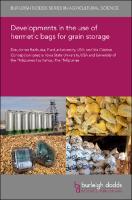Developments in the use of hermetic bags for grain storage
Author(s)
Baributsa, Dieudonne
Concepcion Ignacio, Ma Cristine
Language
EnglishAbstract
Smallholder farmers’ interest in hermetic bags has been driven by the need to reduce grain storage losses due to insect pests and challenges (inefficacy) of current storage methods. Hermetic bags commercially available for grain storage include single-, double- and triple-layer plastic bags. For the last 12 years, more than 20 million hermetic bags have been sold to smallholder farmers and other users in Africa (primarily) and Asia. The rapid increase in the use of hermetic bags is due to the scalability of both awareness activities, including training to create demand and the supply chain efforts to improve availability through the private sector. Many of these hermetic bags have several benefits including (i) preserving grain without the use of insecticides, (ii) keeping grain in good quality from several months to at least two years, (iii) providing farmers the flexibility to sell when prices are high, and (iv) allowing farmers to store grain and seed using the same technology. Challenges to increase adoption of hermetic bags include limited awareness and availability of the technologies in rural areas, variability in the quality of the hermetic bags, and lack of standards to ensure effectiveness across different products.
Keywords
storage losses; hermetic bags; smallholder farmers; developing countries; grainsDOI
10.19103/AS.2020.0072.06ISBN
9781786767622, 9781786767622Publisher
Burleigh Dodds Science PublishingPublisher website
https://bdspublishing.com/Publication date and place
Cambridge, 2020Imprint
Burleigh Dodds Science PublishingSeries
Burleigh Dodds Series in Agricultural Science,Classification
Agronomy and crop production
Sustainable agriculture


 Download
Download